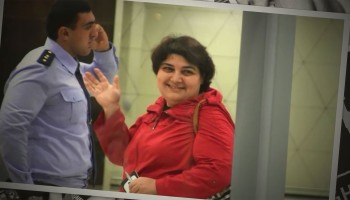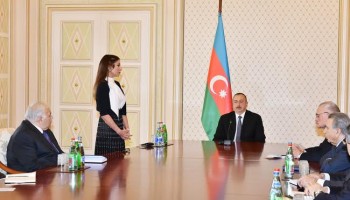This is not the first time Ismayilova, who frequently investigates and reports on corruption, has been subject to attempts to silence her.
U.S. diplomatic cables leaked by whistleblower site Wikileaks show that the Azeri government tried in the past to discredit Radio Liberty and Ismayilova.
In a Jan 23 2009 cable detailing a meeting between Azerbaijani President Ilham Aliyev and U.S. Deputy Assistant Secretary of State Matthew Bryza, U.S. officials say Aliyev requested that Ismayilova be removed from her position because she was “a long-time opposition activist who considers herself to be an enemy of the government.”
According to the cable, President Aliyev objected to US support for Radio Liberty and Ismayilova because the US and Azerbaijan were strategic partners. “The President said that they were looking for a simple change in direction at Radio Liberty,” the cable read.
Ismayilova’s colleagues at OCCRP said the organization supports Ismaylova and condemned the tactics.
“Khadija is one of the best and most courageous investigative journalists in our network. She is uncovering high level corruption in Azerbaijan and she is an inspiration to a new generation of investigative reporters,” said Paul Radu, OCCRP Executive Director.
“This is a clear attempt to intimidate a journalist who is simply doing her job. We will continue to support Khadija and her work anyway we can,” said Drew Sullivan, OCCRP Advising Editor.
“This was a thuggish act that will not intimidate but rather motivate all of us to work harder to uncover the crime and corruption that is destroying democracy, transparency and accountability in Azerbaijan.”
Another cable from October 2008 raised the alarm that pressure on the media increased in Azerbaijan following Aliyev’s ascendancy to the presidency following his father Heydar Aliyev’s death.
“Media contacts state that media in Azerbaijan has worsened under a ‘personally insecure’ president, who has condoned a clampdown on influential, critical media outlets. They point to a number of factors behind the gradual, but steady, decline in media freedom since Ilham Aliyev took office in 2003, including: GOAJ [Government of Azerbaijan] harassment of journalists, the judiciary's lack of independence, a limited advertising market that is dominated by pro-government publications, self-censorship, and a lack of professionalism in Azerbaijan's media industry.”
Ismayilova says she is not the first journalist to be a victim of similar intimidation.
In October 2010, just weeks before parliamentary elections, a pro-government station, TV Lider, attracted public ire when it broadcast a video clip of a person from an opposition newspaper engaged in explicit sexual activity.
It was widely perceived as a government attempt to discredit the opposition in the run up to the elections. The National Television and Radio Council took no action to condemn the broadcast or the invasion of privacy.
A recent example occurred last year when two reporters for the daily Azadliq were attacked and beaten within ten days of each other.





